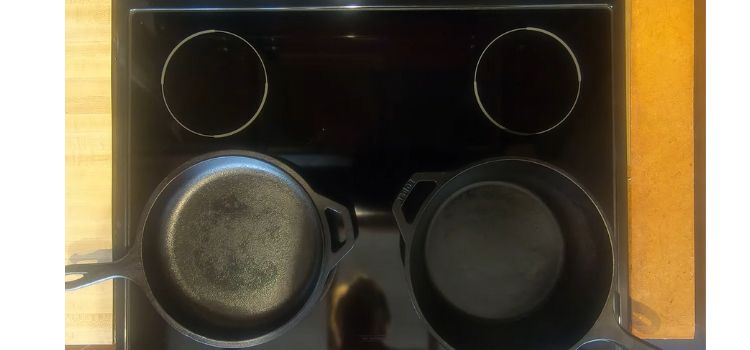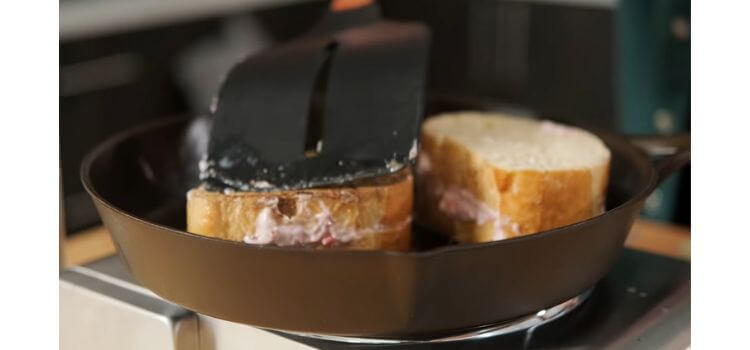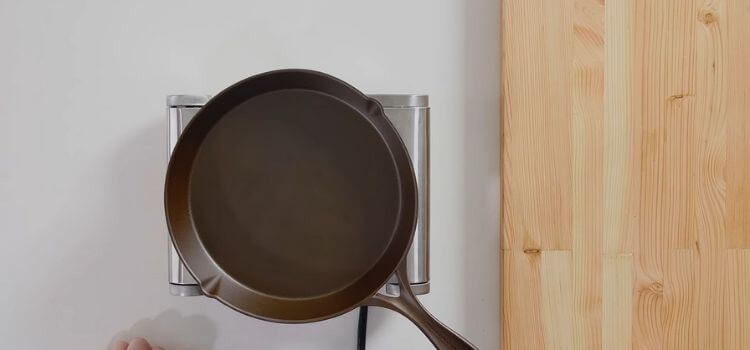Of Course, you can use cast iron on an electric stove. Cast iron works well with electric stoves due to its heat retention properties.
Cast iron cookware is a versatile and durable choice for various cooking methods. Its ability to retain and distribute heat evenly makes it ideal for electric stoves. Many home cooks prefer cast iron for its excellent performance and longevity. Despite being heavy, it offers consistent cooking results and can be used for frying, searing, baking, and more.
Electric stoves benefit from cast iron’s stability, as it maintains a steady temperature. Proper care involves seasoning the cookware to prevent rust and ensure a non-stick surface. With the right maintenance, cast iron can become a staple in your kitchen for years.
Cast Iron Compatibility With Electric Stoves

Can cast iron be used on an electric stove? This is a popular question among home chefs. Cast iron is favored for its strong build and heat preservation. Electric stoves are known for being user-friendly. But are they a good match? Let’s delve into this thoroughly.
Material Properties Of Cast Iron
Cast iron is renowned for its even heating and superior heat retention. This makes it perfect for slow cooking and searing. Cast iron pans are highly durable, capable of lasting for generations, and versatile enough to be used for various cooking methods.
Cast iron is heavy. It maintains stability on the stove due to this weight. When seasoned correctly, the material is also non-stick. It means that cooking will use less oil. Cast iron’s surface can tolerate high temperatures. This works well for recipes calling for rapid cooking at a high temperature.
Electric Stove Design And Function
Electric stoves come in various designs, including coil and smooth-top models. Each design has its own advantages. Coil stoves have exposed heating elements. Smooth-top stoves have a flat, glass-ceramic surface. Both types heat up quickly and provide consistent heat.
Coil stoves are generally more robust and can handle heavier cookware. Smooth-top stoves require more care. Heavy cookware like cast iron can scratch the surface. It is essential to lift the pan instead of dragging it. This protects the stove from damage.
Electric stoves evenly transfer heat all over the cooking surface. This indicates an even heating process for your cast iron pan. Cooking results are improved when heat is distributed properly. Temperature control is another feature that electric stoves offer. For recipes calling for a certain degree of heat, this is helpful.
Common Myths About Cast Iron Usage
Many people believe cast iron pans are unsuitable for electric stoves. These myths often prevent people from enjoying the benefits of cast iron cooking. Let’s debunk these common misconceptions.
Myth: Cast Iron Damages Electric Stove Tops
Many think cast iron damages electric stove tops. This is not true. With proper care, cast iron is safe for electric stoves.
Here are some tips to prevent damage:
- Lift the pan instead of sliding it.
- Clean the stove top and pan regularly.
- Use a flat-bottomed pan for better stability.
Electric stoves can handle cast iron’s weight and heat. Just follow these tips to keep your stove top safe.
Myth: Uneven Heating On Electric Stoves
Some believe cast iron heats unevenly on electric stoves. This myth is also false. Cast iron pans distribute heat evenly and properly.
To ensure even heating:
- Preheat the pan slowly.
- Rotate the pan occasionally.
- Use medium heat settings.
By following these steps, you can enjoy evenly cooked meals. Cast iron works well on electric stoves when used correctly.
Benefits Of Cooking With Cast Iron

Cooking with cast iron has many advantages. Cast iron is versatile and durable. It makes cooking easier and more enjoyable. Let’s explore some key benefits.
Heat Retention And Distribution
Cast iron retains heat exceptionally well. This means your food cooks evenly. The heat spreads across the entire surface. This feature is excellent for searing and browning. Your meals will have a perfect crust every time.
Additionally, cast iron maintains a temperature longer than other cookware. You can keep food warm even after turning off the stove. This is ideal for serving dishes directly from the pan.
Longevity And Durability Of Cookware
Cast iron has extraordinary durability. If properly tended for, it lasts for generations. It’s something you can teach your kids and grandchildren.
Cast iron improves, unlike other cookware, becoming more seasoned with each use. With time, a naturally non-stick surface forms on it. Cleaning and cooking are now easier as a result.
The versatility of cast iron is another advantage. It works with a variety of heat sources. This covers campfires as well as electric cookers and stoves. It is essential to any kitchen due to its durability and versatility.
| Feature | Benefit |
| Heat Retention | Keeps food warm longer |
| Even Heat Distribution | Cooks food evenly |
| Durability | Lasts for generations |
| Versatility | Works on multiple heat sources |
Precautions For Using Cast Iron On Electric Stoves
Using cast iron on electric stoves requires some care. It ensures you don’t damage your stove or your cookware. Follow these precautions to keep both in top shape.
Avoiding Scratches On The Stove Surface
Cast iron is heavy and can scratch the stove surface. To avoid this:
- Lift the pan instead of sliding it.
- Use a stovetop cover or mat.
- Make sure the pan’s bottom is clean and smooth.
Proper Heating Techniques
Using the right heating techniques is crucial. It ensures even cooking and prevents damage:
- Heat the pan gradually. Start with low heat.
- Once hot, increase to medium or high heat.
- Avoid sudden temperature changes. It can warp the pan.
Optimizing Cast Iron Performance On Electric Stoves

Using cast iron on electric stoves can be tricky. But with the right techniques, you can optimize its performance. Cast iron cookware provides even heating and excellent cooking results. To get the best out of your cast iron on electric stoves, follow these tips.
Preheating Cast Iron Skillets
Preheating is essential for cast iron to achieve uniform heat distribution. Place your skillet on the stove over medium heat and let it preheat for 5-10 minutes to prevent uneven cooking and hot spots.
Do not rush this step. Overheating your pan could result in significant harm. Remember, in this case, the gradual and consistent approach prevails.
Maintenance And Seasoning Tips
Maintaining your cast iron properly maintains it in excellent condition. usage warm water and a delicate brush to clean your skillet after each usage. Soap should be avoided as it can remove the seasoning.
Dry your skillet immediately after washing. Use a towel to remove all moisture. This prevents rust from forming. Once dry, apply a thin layer of oil. This maintains the seasoning and keeps your skillet non-stick.
- Clean with warm water.
- Use a soft brush.
- Avoid soap.
- Dry immediately.
- Apply a thin layer of oil.
Seasoning is key for cast iron. To season, coat your skillet with oil and bake it upside down in the oven at 375°F for one hour. This results in a surface that does not stick and defends against rust.
- Coat skillet with oil.
- Bake at 375°F for one hour.
- Cool completely.
Solving Common Problems When Cooking With Cast Iron
Using cast iron on an electric stove is both possible and effective. Ensuring the cookware is heated gradually can prevent warping. Proper seasoning also helps maintain a non-stick surface.
Cooking with cast iron can be rewarding. Yet, it comes with its challenges. Let’s explore how to overcome some common problems.
Managing Temperature Fluctuations
Cast iron takes time to heat up. It also holds heat longer. This can cause temperature fluctuations. To manage this:
- Always preheat your pan for 5-10 minutes.
- Use medium heat to avoid burning food.
- Adjust the heat slowly. This helps the pan to adapt.
For delicate foods, use a heat diffuser. This spreads heat evenly.
Dealing With Persistent Stains And Residue
Persistent stains and residue can be frustrating. Here are tips to keep your pan clean:
| Issue | Solution |
| Burnt food | Scrub with coarse salt and a sponge. |
| Sticky residue | Boil water in the pan. Use a wooden spatula to scrape. |
| Rust | Apply a thin layer of oil. Bake the pan at 350°F for one hour. |
Cookware Alternatives And Complements To Cast Iron
Cast iron is famous for its durability and heat retention. But it’s not the only option for cooking on an electric stove. There are several cookware alternatives and complements to cast iron that can enhance your culinary experience. Let’s explore some of these options.
Non-stick And Stainless Steel Options
Non-stick pots and pans provide convenience and simplicity in the kitchen, ideal for preparing delicate dishes such as eggs and fish. The non-stick coating prevents food from adhering, simplifying the cleaning process.
On the other hand, Stainless steel cookware offers exceptional versatility, making it ideal for searing, browning, and deglazing, as well as withstanding high temperatures while being dishwasher safe.
| Cookware Type | Benefits | Drawbacks |
| Non-Stick | Easy to clean, great for delicate foods | Not suitable for high heat, coating can wear off |
| Stainless Steel | Durable, handles high heat, dishwasher safe | Food can stick, requires more oil |
Combining Cookware For Versatile Cooking
Combining different types of cookware can make your kitchen more versatile. Use cast iron for frying and baking. Use non-stick pans for quick and easy cooking. Use stainless steel for tasks that require high heat.
- Cast Iron: Best for frying, baking, and slow cooking.
- Non-Stick: Ideal for delicate foods and quick meals.
- Stainless Steel: Perfect for searing, browning, and deglazing.
This combination allows you to tackle any recipe with ease. Each cookware type has its strengths, making your cooking more efficient and enjoyable.
Real-life Experiences And Testimonials
Many people wonder if they can use cast iron on an electric stove. Real-life experiences and testimonials can shed light on this topic. We have gathered stories from professional chefs and home cooks who have used cast iron on electric stoves.
Stories From Professional Chefs
Many professional chefs opt for cast iron pans in their culinary spaces due to the uniform heat distribution and long-lasting quality. Chef John, based in Chicago, expresses, “Cast iron performs exceptionally on my electric stove, providing consistent heating and excellent heat retention.”
Another chef, Maria from New York, shares, “I use cast iron for many dishes. It sears meat beautifully and makes perfect pancakes.” These chefs trust cast iron for its performance and reliability.
Home Cooks Weighing In
Home cooks also have positive experiences with cast iron on electric stoves. Sarah from California says, “I use my cast iron skillet every day. It performs well on my electric stove.
Mike from Texas adds, “I was worried at first, but my cast iron pan performs well. It’s my go-to for cooking steaks.” These testimonials show that home cooks also find cast iron effective on electric stoves.
- Sarah from California: “My electric stove operates perfectly with it.”
- Mike from Texas: “It’s my go-to for cooking steaks.”
Both professional chefs and home cooks agree that cast iron is a great choice for electric stoves. Their experiences highlight the benefits of using this durable material.
Frequently Asked Questions
Why Can’t You Use Cast Iron On A Glass-top Stove?
Cast iron can scratch or crack glass-top stoves due to its rough surface and heavy weight. Use with caution.
How Do I Protect My Electric Stove From Cast Iron?
Use a protective cooktop mat or pad. Lift, don’t slide, the cast iron. Clean spills immediately. Use cookware with smooth bases.
Is Cast Iron Better On Electric Or Gas?
Cast iron works well on both electric and gas stoves. Gas provides better temperature control, while electric offers even heating. Choose based on your cooking preference.
Can You Use Any Cookware On Electric Stove?
Yes, you can use most cookware on an electric stove. Ideal choices include stainless steel, cast iron, and non-stick pans. Avoid warped or uneven cookware for best results. Ensure flat bottoms for even heating.
Conclusion
Cooking with cast iron on an electric stove is not only possible but also beneficial. Cast iron’s durability and heat retention make it ideal for electric stoves. Just ensure proper care to avoid damage. Enjoy your versatile and efficient cooking experience with cast iron.
It’s a great addition to any kitchen.
Leave a Reply